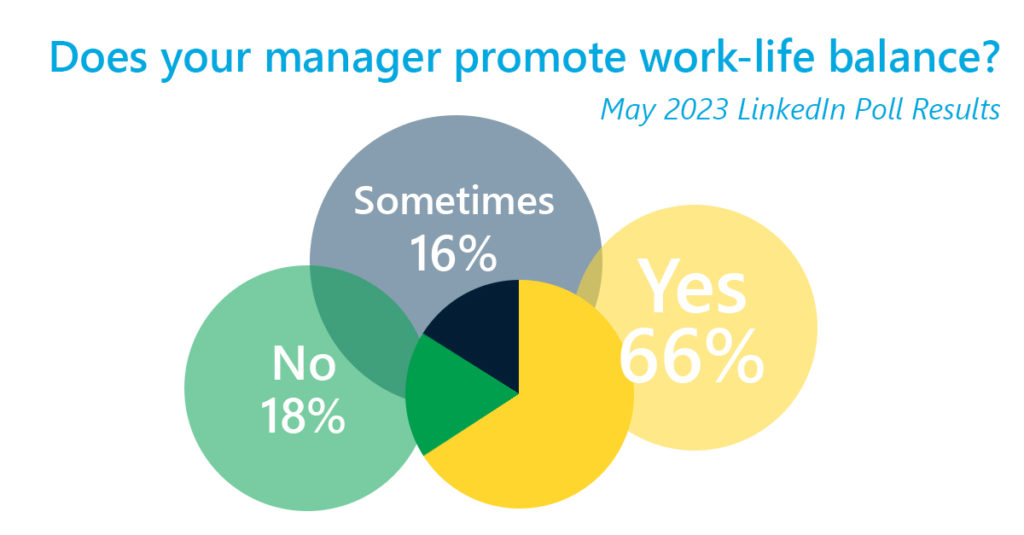
A Manager’s Impact on Employee Mental Health
The average U.S. adult works 38.7 hours a week or 2,012.4 hours per year—which accounts for 23 percent of your life. Spending that much time working with a bad manager can affect your mental health. A report by the Workforce Institute at UKG shares how much influence managers have on their employee’s mental health, and it’s incredibly eye-opening.
Managers have a more significant impact on employees’ mental health (69 percent) than doctors (51 percent) or therapists (41 percent)—and an equal influence as a spouse or partner (69 percent). One in five employees feels that their job negatively affects their mental health, and the effect extends beyond the office, with work stress impacting workers’ home life (71 percent), well-being (64 percent), and relationships (62 percent).
The employee-manager relationship
The employee-manager relationship is a crucial aspect of any organization. It refers to the dynamic interaction between employees and their supervisors or managers. This relationship is essential for maintaining a positive work environment, ensuring effective communication, and enhancing employee productivity and job satisfaction.
A healthy employee-manager relationship centers on trust, respect, open communication, and mutual understanding. Managers who foster such relationships tend to be more successful in motivating and retaining their employees and promoting good mental health. The impact is so strong that more than 80 percent of workers feel that having good mental health is more important than a high-paying job. And 67 percent of employees—and 70 percent of managers—would take a pay cut for a job that better supports their mental wellness.
Good managers understand the needs and aspirations of their employees and take steps to address them. They provide feedback and coaching to help employees improve performance and identify and resolve conflicts.
A Leadership IQ study found that the median time workers spend interacting with their leaders is three hours per week, but the optimal time is six hours.
- Employees that spend six hours per week interacting with their manager are 30 percent more engaged, 29 percent more inspired, 16 percent more innovative, and 15 percent more intrinsically motivated than those who only spend one hour per week.
- Managers (seven to eight hours) and executives (nine to ten hours) experience their highest levels of inspiration when interacting optimally with their leader each week.
Ways to support positive employee mental health
7 in 10 employees want their organization and manager to do more to support mental health. Here are ways to foster positive employee mental health.
- View the whole person: Managers who view the whole employee consider not only their job performance but also their personal life and outside work stressors. They understand that employees may experience life events that can affect their work performance—such as financial problems, family issues, or health concerns. Good managers strive to create a supportive work environment that recognizes the personal challenges of their workers and provides the necessary resources and flexibility to help them manage their work and personal responsibilities.
Related: Working Women of 2023: A New Landscape
- Promote work-life balance: Managers should encourage employees to take breaks, use their vacation time, and maintain a healthy work-life balance to reduce stress and prevent burnout. Leaders should also model healthy behaviors and prioritize their mental health to set an example for employees. A recent Broadleaf LinkedIn poll found:

Related: Why Employees are Quiet Quitting and What Employers Can Do to Prevent It
- Create a culture of continuous feedback: Managers should create a safe and supportive environment for employees to discuss their mental health concerns. This can include regular check-ins, one-on-one meetings, and anonymous feedback surveys.Related: The Importance of Stay Interviews to Retain Talent
- Recognize and address workplace stressors: Managers should identify and address workplace stressors, such as excessive workload, unrealistic deadlines, or a toxic work environment, that may contribute to employee mental health problems.
- Promote a positive workplace culture: Managers should encourage a positive and supportive workplace culture—emphasizing empathy, teamwork, and mutual respect—and show appreciation by recognizing and rewarding their employees throughout the year. Related: The Importance of Appreciating Your Employees
- Offer mental health resources and support: Organizations should provide—and managers should make workers aware of—resources such as employee assistance programs, mental health counseling benefits, and support groups for employees struggling with mental health issues.
- Provide training: Managers and leaders should receive training on recognizing and addressing mental health concerns in the workplace to help them better support employees who may be struggling.
Summary
The impact of managers on employee mental health underscores the importance of workplace initiatives and the need for leaders to prioritize employee mental health and well-being as part of their overall organizational strategy. Companies that do this will experience positive employee engagement, productivity, and retention outcomes.
This blog was written by Broadleaf’s Senior Vice President, Client Delivery, Suzie Mitchell.


